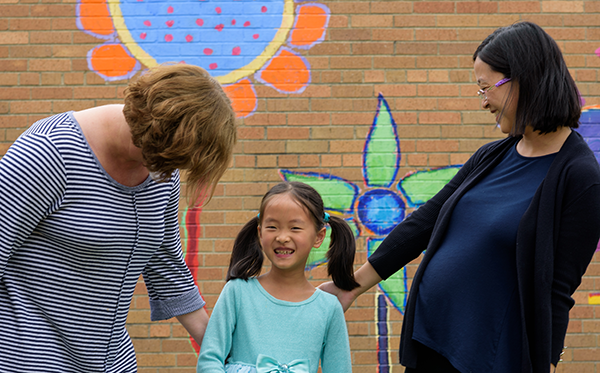MMSD 4K BRIEF
Family Engagement in MMSD’s 4K Program: Implications for Children’s School Readiness
Alejandra Ros Pilarz & Ying-Chun Lin
Summary
This project aims to shed light on family engagement efforts and their implications for children’s school readiness in MMSD’s 4K program. The study addressed three research questions: (1) What family engagement practices do 4K program sites and teachers use to communicate with, involve, and support parents?; (2) How do parents perceive and experience 4K programs’ family engagement practices?; (3) Are family engagement practices related to children’s attendance in 4K and school readiness skills at the end of 4K?
We surveyed principals, directors, and 4K teachers from MMSD school and early care and education (ECE) sites. We then linked these survey data to MMSD administrative records for 4K students in the 2016-2017 program year to estimate associations between family engagement practices and students’ attendance and school readiness skills. Finally, we conducted focus groups with parents at four 4K sites to gather their perspectives on programs’ family engagement practices and barriers to parental involvement.

![]()
Key findings
- According to directors and principals, 4K programs implemented a high level of family engagement practices that are aligned with the MMSD Family and Community Engagement (FACE) Standards. However, approximately 50% or fewer programs offered interpreters for non-English speaking parents during group parent meetings, provided parenting classes/resources, or referred parents to a variety of family support services (e.g., social services).
- 4K teachers reported frequent communication with parents about their child’s learning, including sharing information about their child’s day and discussing parents’ concerns.
- Teachers provided a variety of parental involvement opportunities at least several times per year, including inviting parents to volunteer in the classroom and to family social events. On average, teachers at ECE sites reported offering parental involvement opportunities more frequently than teachers at MMSD school sites.
- Parents viewed regular, two-way communication with teachers as important for building strong, trusting parent-teacher relationships and supporting their child’s learning at home. Parental involvement opportunities helped parents build a sense of community and develop supportive relationships with other parents, but scheduling conflicts and, for some Spanish-speaking parents, language barriers hindered participation.
- 4K programs’ efforts to connect parents to family support services in the community made parents feel welcome cared for. However, some parents reported being unaware of services through their school, and Spanish-speaking parents’ access also depended on the availability of Spanish-speaking staff.
- Teachers’ practices—for communicating with and involving parents—were associated with higher early literacy skills at the end of 4K, but site-level practices (e.g. welcoming environment) were not, with the exception of programs’ efforts to connect parents to family support services. These findings should not be interpreted as causal.
